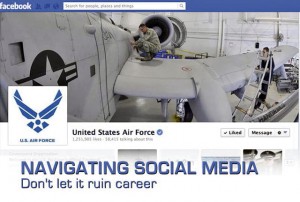FORT GEORGE G. MEADE, Md. — Engaging in social media can be a positive experience that entertains, keeps people connected and allows opinions to be expressed on a wide variety of topics.
In some cases though, social media can ruin personal reputations or careers, and create an open window for criminals to access personal information.
According to the Air Force’s top social media expert, safe use of social-media outlets is simple — use common sense.
Tanya Schusler is the chief of social media for the Air Force Public Affairs Agency, Joint Base San Antonio-Lackland, Texas. She said in many cases, problems arise when people are “too trusting” with their personally identifiable information.
“It can be something as simple as sharing your location when visiting your favorite store or restaurant,” Schusler said. “This tells your social network one critical piece of information — you’re not home.”
To take full advantage of social media, and still post to Facebook and tweet to friends safely, Schusler offered the following advice: Many Airmen cause issues by posting photographs of themselves violating appearance standards, acting inappropriately and most importantly, violating operational security protocol. If you’re not within regulations, don’t post it.
Airmen should not post information about deployments or photos of secure areas within their workplace. Even if the Airman takes the information down shortly after posting, someone has already seen it. The information can be printed, screen captured, copied etc. Once information is released to the Internet, it’s there permanently.

When posting personal opinions about Air Force topics, provide a disclaimer stating the opinion as your own, and not that of the Air Force. This can be done either as a disclaimer on a profile, or on each individual post and will alleviate any potential confusion from followers reading the post.
If an Airman posts a statement about hurting himself or others, time is of the essence. Contact 911 if you know the location of the Airman. If you do not know the person’s location, contact the command post or your supervisor for assistance in locating the Airman. It is important to seek help for these individuals immediately.
Using certain security features within social media sites can help mitigate some of the risk of personal information being shared. However, privacy policies change almost daily, and Airmen may not know about the updates.
Therefore, do not rely on site security measures alone. Be careful of whom you allow into your social media networks, and don’t trust that the account will always remain secure. Assume personal responsibility.
Airmen’s social-media pages are their personal space, and they are encouraged to tell their personal Air Force stories through social networks.
They simply need to ensure the information they post is cleared for release and within regulations. Don’t jeopardize the mission or put anyone’s life, or lives in danger. Think before you post.
“We don’t want Airmen to feel like they are stifled from sharing information,” Schusler said. “We just want to emphasize the use of common sense to keep people safe.”
If Airmen have questions about acceptable posting to social media, there are resources available to them for guidance. AFPAA has published a new booklet, the Air Force Social Media Guide, available for download here, or at www.af.mil on the homepage under the social media icons. Airmen can also contact their local public affairs office with questions.


